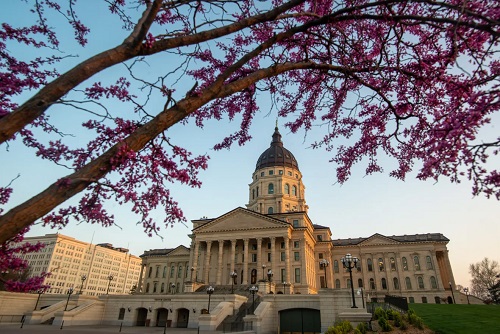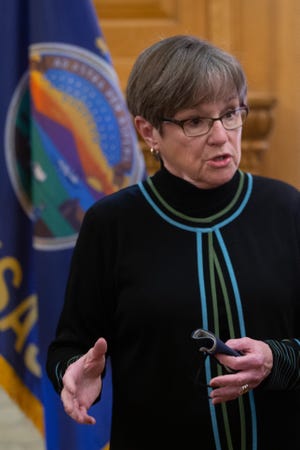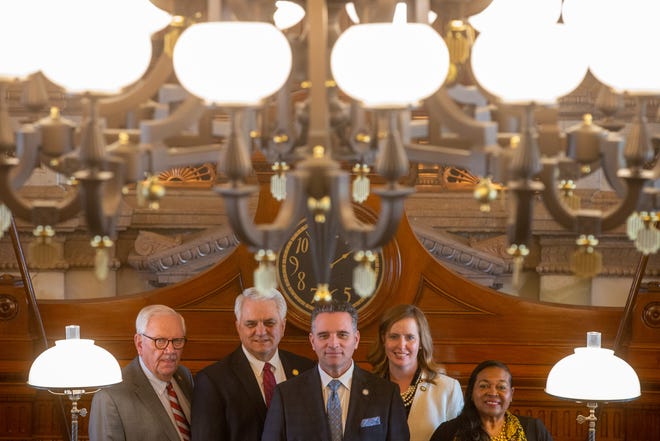
4.24.22 – cjonline
Kansas lawmakers return to Topeka with several high-profile policy questions, including veto override attempts, tax cuts, budgets and sports.
Lawmakers return to Topeka on Monday for the veto session after leaving several high-profile issues unresolved before the abrupt adjournment of the regular session earlier this month.
After three weeks away from the capitol, politicians will resolve policy debates with the looming election season. The governor’s race is heating up with political advertisements hitting the airwaves.
Some major legislative proposals are unlikely to succeed. Despite efforts to pass medical marijuana, Medicaid expansion and election security bills, those appear unlikely to cross the finish line.
The top issues to watch include taxes, budgets, legalizing sports betting, veto overrides and public health measures.
Tax cuts
Gov. Laura Kelly’s signature policy priority this session is on rough footing as election season heats up.
After legislative leadership never advanced any tax bills to the floor, lawmakers negotiated dozens of tax proposals into three bills during conference committee week. Only one passed before the spring break.

Kelly signed that bill, HB 2239, which was a collection of 29 previously separate tax bills. The $310 million in tax cuts over three years is highlighted by $134 million in residential property tax cuts, amounting to $46 per year for most homeowners.
A food sales tax cut could be in the works, but GOP leadership and Kelly have competing plans. Kelly wants to fully eliminate the state’s 6.5% sales tax on groceries starting this summer with HB 2487. The proposal from GOP leadership, HB 2106, would wait until after election day to gradually reduce the tax until it reaches zero in 2025.
A third tax bill, HB 2597, is a collection of bigger-ticket and more controversial tax policies. The various pieces will collectively cost an estimated $432 million over three years.
The bill most notably includes COVID-19 retail storefront property tax relief, which would use approximately $56 million in additional funds from the federal government.https://omny.fm/shows/from-the-newsroom-the-topeka-capital-journal/chillin-in-the-statehouse-episode-37-a-taxing-podc/embed
Budgets and education policy
One budget bill, SB 267, has already been signed into law. But a budget omnibus bill is still to come with further spending plans, and the Legislature has yet to pass a budget for K-12 education.
The debates come after new consensus revenue estimates last week increased the projected tax revenue by $340 million over two fiscal years. State coffers are currently projected to have a $3.1 billion budget surplus at the end of fiscal year 2023.
With the windfall, educators have pushed for millions of dollars in additional special education funding. The education budget has been held up by policy debates politicians chose to attach to school funding.
The governor’s office has requested budget amendments, highlighted by a proposed one-time $250 tax rebate to all Kansas residents who filed a tax return.Your stories live here.Fuel your hometown passion and plug into the stories that define it.Create Account
“I want to return this money to the people who earned it,” Kelly said. “Especially right now, when we are all experiencing the impact of rising costs at the pump and the grocery store, the state can make an immediate and direct impact to help Kansas families pay their bills and save for the future.”
Such a plan would cost about $460 million, but it is unlikely to win the approval of Republican lawmakers, who view it as an attempt to buy votes during an election year.
Attorney General Derek Schmidt, the Republican frontrunner in the governor’s race, called on the Legislature to further pay down pension debt. Such a move would lead to long-term savings on debt service. He told policymakers that they should “resist the temptation for a new spending spree.”
“Legislators also should fully fund public schools as promised, reduce or eliminate the state sales tax on groceries, and then place the rest of this windfall in a rainy day fund,” Schmidt said.
Veto overrides

Republican leadership will seek to whip enough votes to override a slew of gubernatorial vetoes.
The most notable vetoes came on a pair of bills to implement a so-called parents’ bill of rights and to ban transgender students from competing on girls and women’s sports teams.
The parents’ bill of rights bill, SB 58, is designed to increase the ability for parents to inspect and review curriculum used in classrooms. Kelly called it a “teacher demoralization act.”
Educators have said the concept is overly burdensome, though the version approved by the Legislature was less restrictive than what some Republican lawmakers pushed for.
To override the veto, Republicans need 17 more yeas in the House and four more in the Senate.
The transgender sports ban, SB 160, needs 10 more ayes in the House and two more in the Senate to override the veto. Kelly also vetoed the bill last year, which critics have said is an attack on LGBT youth. Proponents say they are trying to protect the integrity of female sports.
Additional veto override attempts could come on two other bills.
Kelly vetoed a food stamp bill, HB 2448, which had a veto-proof majority in the Senate but was 14 votes short in the House. The bill creates a new work training requirement for able-bodied adults without dependents who work fewer than 30 hours a week.
The governor also vetoed SB 286, which paired an expansion of COVID liability immunity protections for health care facilities with various other provisions. That bill barely squeaked through the Legislature after opposition from Democrats and far-right Republicans.
Kelly said she would like to see new legislation that renews the liability protections using the previous language, which the Legislature allowed to expire.
Republicans won’t override a veto on another controversial bill because Kelly signed it, despite objections of most Democrats. The law, which Schmidt introduced as HB 2717 to prevent local sanctuary cities for immigrants, had enough votes in the Legislature to override a veto.
Sports betting
Lawmakers were unable to pass a bill legalizing sports betting before taking their break. The Senate didn’t take up the issue after SB 84 squeaked by in the House with the slimmest of majorities.
The bill would amend current laws to allow sports wagering operations by lottery gaming facilities. It would also authorize historical horse race machines under parimutuel racing statutes.
A late addition the lengthy legislation was a provision apparently targeted at luring the Kansas City Chiefs to move across the state line. The mechanism would direct most of the state’s sports gambling revenues into a fund aimed at attracting professional sports to Kansas. The money would be controlled by legislative leadership and the governor’s office.
Despite policy disagreements and controversy, lawmakers are expected to legalize sports gambling before leaving Topeka. Expansion advocates don’t want Missouri to beat Kansas to the punch.
COVID-inspired public health bills
When Kelly signed the November special session law guaranteeing religious and moral exemptions to workplace vaccine mandates, the governor indicated that her signature would preempt further legislation targeting public health measures.
That strategy appears to have worked so far, as conservative Republicans have been unable to pass bills targeting vaccines and quarantines while promoting off-label drugs.
The Senate previously passed four bills — SB 489, SB 541, HB 2280 and HB 2416 — though none of them reached the 27-vote supermajority needed to override a veto, and the House never acted on any of them.
The bill that appears most likely to advance is also the one that has been the most controversial: HB 2280, which promotes ivermectin and hydroxychloroquine as off-label COVID-19 treatment, preempts health board investigations related to the pandemic and grants moral exemptions to all childhood wellness vaccines required to attend schools and day cares.
There may be an attempt to tie the fate of the ivermectin bill to another one one the 988 suicide hotline.
That bill, SB 19, would appropriate $10 million for call centers and support services. But there is a concern among some legislators that senators may block the bill if HB 2280 doesn’t advance. A similar move happened last month when House negotiators refused a Senate demand to insert anti-quarantine provisions into SB 12, which is focused on Kansas Department for Children and Families contracts.
The provisions came from SB 489, which overhauls quarantine laws to strip local health officers and the Kansas Department of Health and Environment from ordering quarantines and isolations for any infectious disease.
Among the provisions in the various rewrites of public health laws are mask mandates bans on any level of government, blocking schools from discriminating based on COVID-19 vaccination status and requiring government compensation for businesses affected by public health orders.
Republicans have especially pushed for expanding religious exemptions on childhood vaccine mandates to include non-religious moral and ethical beliefs.
Sen. Mark Steffen, R-Hutchinson, said at a legislative forum earlier this month that HB 2280 is “still very much alive.”
“It really isn’t anybody else’s right to judge your sincerity in regards to that religious exemption,” Steffen said. “You basically take a napkin and a crayon and write, ‘I don’t want this shot because it’s not good for me, I don’t believe in it,’ and that has to be accepted as an exemption.”
Jason Tidd is a statehouse reporter for the Topeka Capital-Journal. He can be reached by email at jtidd@gannett.com. Follow him on Twitter @Jason_Tidd.
